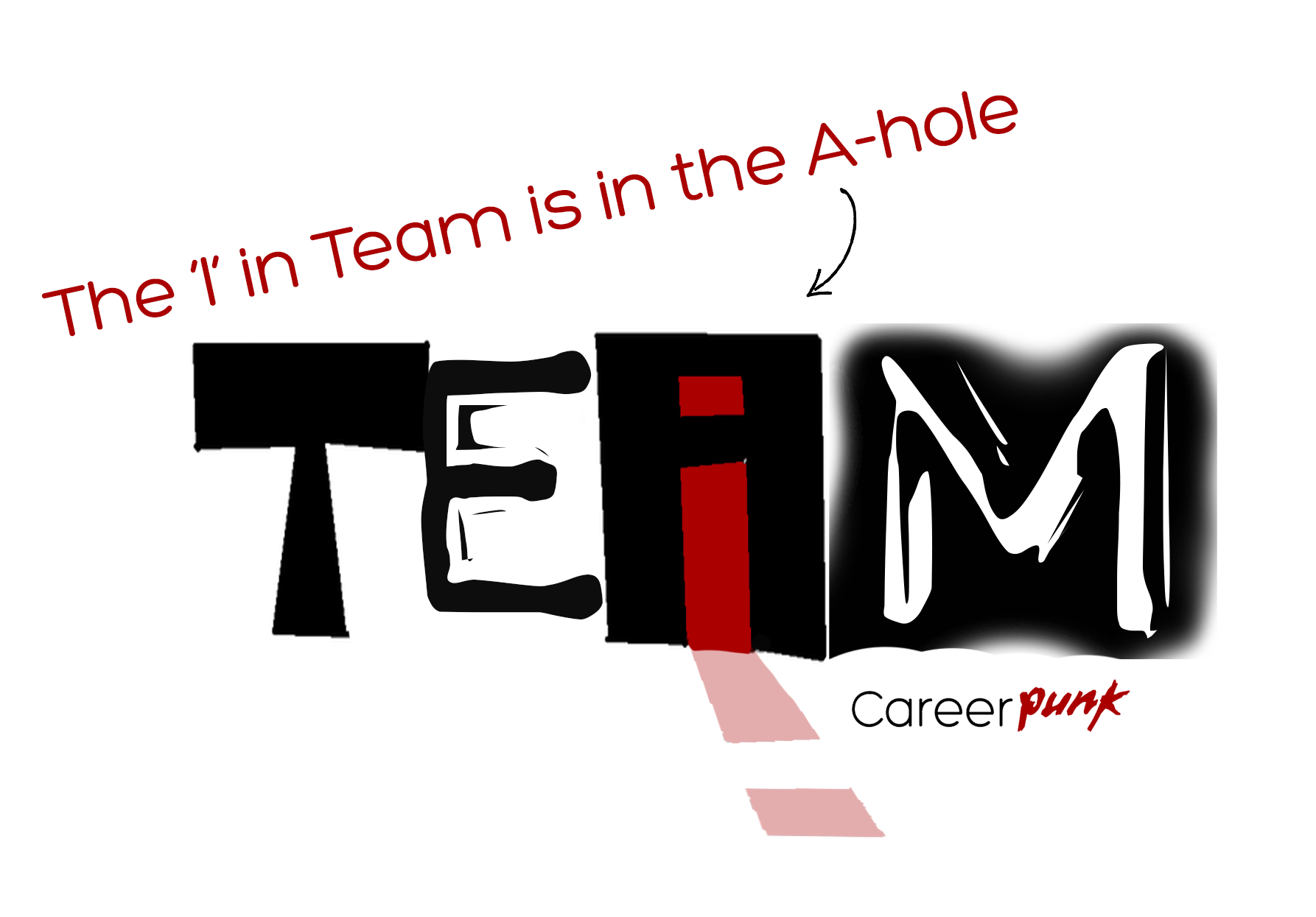The term ‘team player’ is probably one of the most overused yet relevant, desired qualities across all the workforce. It’s definitely the most generic skill used on resumes as well as in job descriptions. And don’t get me started on all the annoying office mottos it’s spawned (“There is no ‘I ‘in team”, “We, better than me”, “Teamwork makes the dream work!”). But if it’s such a cliched quality why the importance? Because no one wants to work with an asshole, that’s why. And guess where the “I” in Team has been found, that’s right, the A-hole.
So, when’s the last time you sang kumbaya?

Yes, it seems everyone wants an employee with the ability to play well with others. With CareerPunk’s encouragement of always embracing your individuality, it begs the question, “Why should I give a rat-fink about being a team player when my solo game is crushing like bae?” Because individuality doesn’t mean isolation.
Think about it. No less than 24% of your time each year (2,080 hours) is spent at work. If nearly a quarter of your life is to be in the company of the same people, wouldn’t it be nice if they didn’t suck? That means you too. Not sucking starts with getting along with your peers and then sharing your individuality. When you become a team-player something else happens. You become more promotable.
The truth is a majority of work these days is accomplished in teams. This may consist of your internal colleagues, cross departmental initiatives, or even 3rd-party collaborations. How you work with others will travel fast, including into the ears of your would-be promoters. Being a team player will raise your reputation within the company and attract others to want to work with you. Here are the key elements to being a great team player.
- Communication
- Be clear, concise, deliberate, and tactful.
- The ability to hear and be heard is essential when working with a team. And as so, communication should be defined as both sending AND receiving information. Doing only one without the other will make you a poor communicator.
- HOW you deliver information often dictates how others receive it. Remember there are many ways to communicate (visually, verbally, physically, etc.) and a great communicator will be perceptive to all of these cues. And once you’ve identified your audience, make sure you’re matching your delivery appropriately.
- Commitment – go beyond the expectation
- Flexibility – know when to lead, when to follow
- Supportive – create the environment where all can participate. Empower others.
RISE ABOVE
Being a team player extends beyond just working in the team environment, though. To achieve all of the above you need to rise above the bullshit of the office drama, the gossip, and the politics. That means consistently demonstrating your integrity. Stick up for your teammates by separating yourself from the chatter and nonsense. This behavior will naturally elevate your disposition and send the message to others that you are leadership material. And if you want to get promoted, you need to become a leader. Knowing how to operate successfully within a team is a key function of that process.
IT’S SCIENCE
For those data-jocks out there, consider this abstract from the 2008 published research conducted by Jeff LePine, Ron Piccolo, Christine Jackson, John Mathieu, and Jessica Saul, where they found that functional team participation increased individual success rates by up to 25%!
“Meta‐analytic results indicated that teamwork processes have positive relationships with team performance and member satisfaction, and that the relationships are similar across the teamwork dimensions and levels of process specificity.” -LePine, Piccolo, Jackson, Mathieu, Saul
And a recent Twitter survey concluded that:
“About 75% of employers rate team work and collaboration as “very important”, yet only 18% of employees get communication evaluations at their performance reviews.”
What’s the callout here? That while most agree on the importance of teamwork, the implementation and execution of it successfully, is rarely addressed. This mean YOU have a great opportunity to drive proper practices and adoption within your own work environment, ultimately resulting in both individual and collaborative successes. Take advantage now, as being a team player will not only improve your work life but it will also expedite your career advancement. This skill, despite its ubiquity in resumes and job descriptions, is crucial for your professional success. If those motivational posters (and hopefully this article) have taught you anything, it’s that (as much as I hate to say it 😐 ) teamwork actually does makes the dream work.
This is just one aspect of career advancement. To learn more ways you can get promoted continue the series here: “Simply Master These 4 Areas To Get Promoted”
And if you haven’t already, signup for our Newsletter Underground and get our FREE Guide: “5 Things to Say to Your Boss Tomorrow to Get Noticed”










